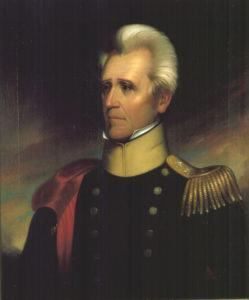Trump Doesn’t Know Much about History…or Does He?
 Andrew Jackson (Ralph Eleaser Whiteside Earl, 1837)
Andrew Jackson (Ralph Eleaser Whiteside Earl, 1837) History is more than facts, names, and dates. It’s about discovering why the world is the way it is today because of the events that came before, as well as asking ourselves how the world would have been changed had things happened differently.
In an interview with the Washington Examiner earlier this week President Trump mused, “had Andrew Jackson been a little later you wouldn’t have had the Civil War.” It’s interesting that Trump said Jackson could have kept the Civil War from happening, partly because he did avert a crisis of secession during his time as president, with the very state—South Carolina—that led the wave of secessions that started the Civil War. That, however, was over the 1828 Tariff of Abominations, and the incident was called the Nullification Crisis. South Carolina nullified a protective tariff passed by the federal government because they had an export economy.
Trump is a little bit like Jackson in that in order to get elected both made outlandish promises only to renege on them once the reality of the presidency took hold. Jackson had promised to overturn the tariff imposed by the John Quincy Adams administration but failed to do so once in office. In response, South Carolina declared it unconstitutional and nullified it.
That was different than the Civil War secession threat because it was mostly about the tariff and only indirectly related to slavery. (Sorry revisionists, the Civil War was not about tariffs or state’s rights, it was about slavery, cut and dry.) Thus, South Carolina didn’t have the support from the other southern states during Jackson’s time in office as it would when Lincoln was sworn in.
Jackson averted the crisis by threatening to use force and by negotiating down the tariff. This tells me that had Jackson been president in 1861, we may have indeed temporarily been able to avoid the Civil War. The threat of force would not have worked, so he would have negotiated. In fact, it likely never would have reached that point at all during his presidency because he was a slave owning white supremacist who would have been friendly to the southern agenda. Unlike Lincoln, he would have vetoed any bill that came across his desk limiting the spread of slavery to new states. So Trump is right, had Jackson been president in 1861 there would have been no civil war—in 1861. Instead, slavery would have spread.
The election of Lincoln was an anomaly caused by a temporary rift in the Democratic Party between north and south over slavery. Even the moderate Democrats wanted to let the new states choose whether they wanted to be free or slave states. The Republican control of the House was also a brief anomaly caused by backlash over the Dred Scott Decision and a brief abolitionist upsurge. This would correct itself once the Democrats ironed out their differences and the Republican’s protectionist policies began to hurt the economy. (People will always place their pocket book above their morals.) With Jackson in the White House protecting slavery with his vetoes, situations like Bleeding Kansas would have played out over and over again throughout the West. There still would have been a Civil War, however it would have just happened ten to twenty years later when military technology had reached a point where the war would have been even more horrendous than it actually was.
Military history is interesting in that the advantage shifts back and forth throughout the ages between the offensive and the defensive. The Civil War was horrible because it was fought just as the balance was beginning to shift to the defensive, with the adoption of the bullet called the Minié ball, which allowed for long-range precision fire. This advantage only intensified in the coming decades, culminating with the machine gun, barbed wire, advanced landmines, and the steel encasements of the First World War. It shifted back to the offense in the 1930s as mechanized mobility, wireless communication, and combined arms warfare were developed. If the Civil War had been fought during the pinnacle of the defensive advantage, the combination of unlimited Northern manpower and unbeatable Southern defensive positions would have resulted in unthinkable carnage. Not to mention the human suffering of those enslaved would have carried on for another generation, and the partisan bloodletting over slavery would have infected half a dozen additional western states.
To make matters worse, we would have been embroiled in an unbelievably destructive conflict during the crucial time we otherwise would have been on track to establish an empire in the Western Hemisphere. Spain was a failing empire at the time and without our ability to enforce the Monroe Doctrine, the ascendant German empire would have stepped in. This may have in turn given Germany the resources necessary to fight and win the First World War and quite possibly expand their foothold into North America and even our western territories. We quite possibly would have never become a world superpower.
So, yes, Mr. President—Andy Jackson likely would have avoided the Civil War as it occurred, but would that have really been in our best interests or the best interests of five million enslaved human beings? And are you SURE you’re not racist?!
